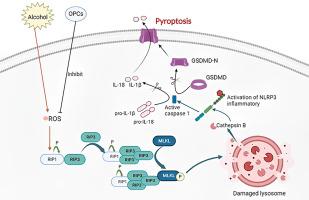Proanthocyanidins alleviate acute alcohol liver injury by inhibiting pyroptosis via inhibiting the ROS-MLKL-CTSB-NLRP3 pathway
IF 6.7
1区 医学
Q1 CHEMISTRY, MEDICINAL
引用次数: 0
Abstract
Background
Alcoholic Liver Disease (ALD) is a hepatic disorder resulting from prolonged or excessive alcohol intake. The predominant manifestation of ALD is fatty liver, which progresses to alcoholic hepatitis as the disease worsens. Pyroptosis is a novel type of programmed cell death that is intricately linked to the inflammatory cascade, presenting a promising avenue for therapeutic intervention in the management of ALD. Oligomeric proanthocyanidins (OPCs) are polyphenols extracted from grape seeds that have anti-inflammatory and antioxidant properties. However, whether OPCs can treat ALD by suppressing pyroptosis is not completely clarified.
Purpose
To explore the role of OPCs in ALD to inhibit pyroptosis and its mechanism.
Methods
In vitro, HepG2 cells were employed to evaluate the beneficial impact of OPCs on alcohol-induced pyroptosis. MTT colorimetric method, enzyme-linked immunosorbent assay (ELISA), western blot (WB), immunofluorescence, acridine orange (AO) staining, and reactive oxygen species (ROS) assay were performed. In vivo, C57BL mice were used and gavaged with alcohol and OPCs. Hematoxylin-eosin staining (HE) staining, alanine aminotransferase (ALT), aspartate aminotransferase (AST) level assay, and WB were performed.
Results
The findings revealed that OPCs could reduce the alcohol-induced increase in pyroptosis-related proteins, such as pyrin domain-containing 3 protein (NLRP3), cleaved-caspase 1, gasdermin D (GSDMD-N), Interleukin-18 (IL-18), IL-1β (IL-1β). In in vitro mechanistic experiments, We discovered that OPCs ameliorate alcohol-induced pyroptosis by decreasing cathepsin B (CTSB) leakage-mediated NLRP3 activation. More significantly, we discovered that alcohol phosphorylates mixed lineage kinase domain-like protein (MLKL), enabling P-MLKL to translocate to the lysosomal membrane and induce lysosomal membrane permeabilization (LMP). OPCs might counteract the effects of alcohol by reducing the leakage of CTSB and inhibiting the phosphorylation of MLKL through the scavenging of ROS.
Conclusions
These results suggested that OPCs might counteract ALD by inhibiting pyroptosis through the ROS-MLKL-CTSB-NLRP3 pathway. Our study offered fresh insight into the ways in which naturally occurring chemicals shield ALD against harm.

求助全文
约1分钟内获得全文
求助全文
来源期刊

Phytomedicine
医学-药学
CiteScore
10.30
自引率
5.10%
发文量
670
审稿时长
91 days
期刊介绍:
Phytomedicine is a therapy-oriented journal that publishes innovative studies on the efficacy, safety, quality, and mechanisms of action of specified plant extracts, phytopharmaceuticals, and their isolated constituents. This includes clinical, pharmacological, pharmacokinetic, and toxicological studies of herbal medicinal products, preparations, and purified compounds with defined and consistent quality, ensuring reproducible pharmacological activity. Founded in 1994, Phytomedicine aims to focus and stimulate research in this field and establish internationally accepted scientific standards for pharmacological studies, proof of clinical efficacy, and safety of phytomedicines.
 求助内容:
求助内容: 应助结果提醒方式:
应助结果提醒方式:


